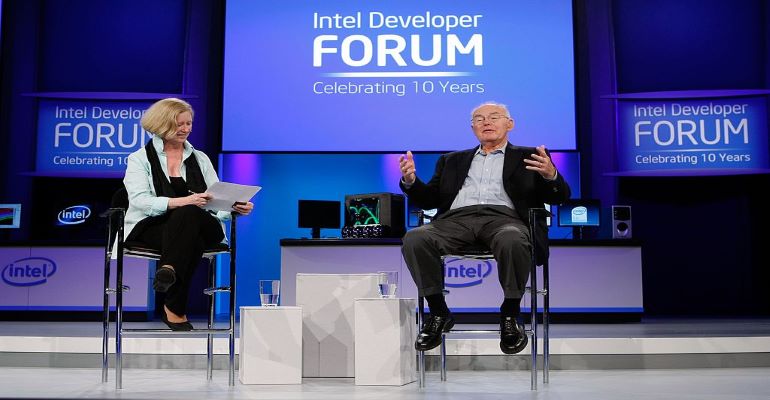Intel Co-Founder Gordon Moore Passes Away
Silicon Valley pioneer created Moore’s Law, which became a barometer for the dizzying pace of chip technology development.

Silicon Valley has had a rough time recently, with many tech firms struggling and laying off workers. On Friday, the area took another hit when one of its historically most significant figures, Intel co-founder Gordon Moore, passed away at the age of 94.
Moore co-founded NM Electronics in 1968 with Robert Noyce, which later became Intel Corporation. Intel is arguably the most significant company in the modern-day electronics era, pioneering many of the microprocessors that have powered PCs over the past three decades. Despite recent struggles, Intel remains one of most influential electronics companies.
Equally as important, Moore, whose education included a PhD in Chemistry from the California Institute of Technology, was a keen observer of the rapid progress in electronics throughout his storied career. In 1965, Moore published an article stating that transistor density was doubling each year. He predicted at the time it would continue to double for the next ten years.
This prediction became what is now known as Moore’s Law, which Moore revised in 1975 to project a doubling of transistor density every two years. Regardless, Moore’s Law has for decades been a barometer to measure the progress in semiconductor development through ever-smaller components and shrinking process geometries.
Integration Marches On
While recent years have brought more speculation over whether current chip process technologies can continue to uphold the principles of Moore’s Law, the semiconductor industry has not stopped shrinking chip geometries and looked for ways to integrate more functions.
For Moore, Intel was the pinnacle of a career that spanned the post-war electronics era. After graduating from CalTech, Moore began working at John Hokpins University’s Applied Physics Laboratory. He was recruited by William Shockley, the physicist responsible for helping invent the transistor to work at Shockley Semiconductor Laboratory near Stanford University. But Moore and seven other scientists bolted from Shockley and, with the financial backing of Sherman Fairchild, founded Fairchild SemIconductor.
Gordon Moore’s role in the rise of semiconductor industry was heavily influenced by his roles at Intel, where he served as executive vice president until 1975, when he became president. Moore became Intel’s chairman and CEO in 1979, holding that position until April 1987, when he became chairman. Moore became chairman emeritus in 1997. Moore, along with Noyce and later Intel CEO Andrew Grove, presided over many of the major advances in microprocessors as well as memory and other semiconductors.
Conservation Work
Moore’s honors included being named a fellow for the Institute of Electrical and Electronic Engineers (IEEE) as well as receiving the IEEE Medal of Honor. Later on in his life, Moore and his wife Betty, whom he married in 1950, established the Gordon and Betty Moore Foundation, which targeted environmental conservation, science, and the San Francisco Bay area. Moore was also involved in other philanthropic efforts.
Gordon Moore is survived by his wife Betty, two sons, Kenneth and Steven, and four grandchildren.
A candid interview with Gordon Moore from the Computer History Museum follows.
Spencer Chin is a Senior Editor for Design News covering the electronics beat. He has many years of experience covering developments in components, semiconductors, subsystems, power, and other facets of electronics from both a business/supply-chain and technology perspective. He can be reached at [email protected].
About the Author(s)
You May Also Like





